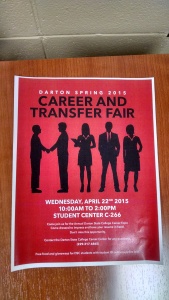Summer is just a couple of weeks away for Darton students. A lot of students take the summer off to relax and take a break from school work. However, other students use that time off from school to get a job or enhance their resumes.
Experience for the Future
Nickey Pope, a journalism student at Darton State College, is planning on working a normal job and a small career-based assignment. “I planned on just working at little knick-knack places like Ross and Home Depot and stuff like that. I applied for them; but I’m working with Mr. Perkins for the filming of graduation, so hopefully that adds a little bit of experience and I can put that on my resume.”
Nickey is also planning ahead for next year. Since she graduates next year, she wants to secure an internship. “I planned on getting an internship at Fox 31 this semester, but unfortunately they don’t do paid internships anymore. They only do college credit-based internships, so you actually have to be enrolled in college in order to have an internship there, so since I figured I found that information out, I’m just gonna do it the semester before I leave.”
Building Up Those Resumes
The main reason students get career-based jobs or internships is to make their resumes stronger. That is very important in the career world. Employers want you to have experience points and a variety of skills on your resume, so they can see the qualifications you have for a particular job. Tim Holley, the manager at Staffing People in Albany, Georgia, explains why.
“Well that’s part of the job market out there is that they’re not specific on their resumes on which positions they’re looking for; they’re just basically general. Okay, so if they’re very, very specific in having more than one resume targeting different areas than with their experience, they’ll be noticed more.”
And since the job industry is very competitive, being noticed is extremely important.
Nickey Pope understands this, which is why she is focusing more on experience from a job rather than money from a job.
“I would like both, the experience and the money, but if it’s just for the experience, money will come later, so just like while I’m in college I’m trying to get as much experience as I can get now, so I can put it on my resume so I can make it stronger when I do get in the job industry.”
Balancing School and Portfolio Distribution
Talika Postell, another journalism student at Darton State College, is putting forth a double effort this summer. She is taking on summer classes as well as putting herself out there for employers.
“Well my plans for this summer, I will be attending Darton State College for my fourth semester, so I’ll be in school finishing up and graduating this summer so I will be attending school and looking forward to branching out, getting my portfolio out to different sources, radio and television companies.”
Getting your portfolio and resume out early is a great idea. It helps your chances of getting a great career-based job right after you graduate.
A lot of students take it upon themselves to learn and work hard during the summer to get a head start on their future. If you need help figuring out how to put together a resume or if you need help finding a job, contact the Career Development Center at 229-317-6865 or visit the Center in Room 103 M of the Student Center. You can also visit the Center’s page on the Darton website to make an appointment with an advisor or search for available jobs on campus and internships.


